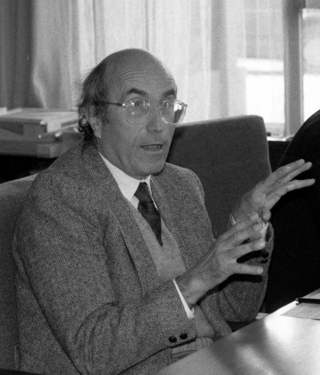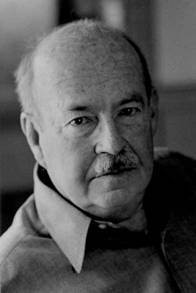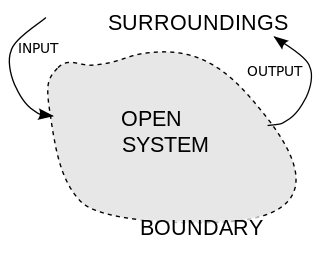
Niklas Luhmann was a German sociologist, philosopher of social science, and a prominent thinker in systems theory.
Systems theory is the transdisciplinary study of systems, i.e. cohesive groups of interrelated, interdependent components that can be natural or artificial. Every system has causal boundaries, is influenced by its context, defined by its structure, function and role, and expressed through its relations with other systems. A system is "more than the sum of its parts" when it expresses synergy or emergent behavior.

Talcott Parsons was an American sociologist of the classical tradition, best known for his social action theory and structural functionalism. Parsons is considered one of the most influential figures in sociology in the 20th century. After earning a PhD in economics, he served on the faculty at Harvard University from 1927 to 1973. In 1930, he was among the first professors in its new sociology department. Later, he was instrumental in the establishment of the Department of Social Relations at Harvard.

An open system is a system that has external interactions. Such interactions can take the form of information, energy, or material transfers into or out of the system boundary, depending on the discipline which defines the concept. An open system is contrasted with the concept of an isolated system which exchanges neither energy, matter, nor information with its environment. An open system is also known as a flow system.

Structural functionalism, or simply functionalism, is "a framework for building theory that sees society as a complex system whose parts work together to promote solidarity and stability".

Organizational theory refers to a series of interrelated concepts that involve the sociological study of the structures and operations of formal social organizations. Organizational theory also seeks to explain how interrelated units of organization either connect or do not connect with each other. Organizational theory also concerns understanding how groups of individuals behave, which may differ from the behavior of an individual. The behavior organizational theory often focuses on is goal-directed. Organizational theory covers both intra-organizational and inter-organizational fields of study.

In the social sciences, social structure is the aggregate of patterned social arrangements in society that are both emergent from and determinant of the actions of individuals. Likewise, society is believed to be grouped into structurally related groups or sets of roles, with different functions, meanings, or purposes. Examples of social structure include family, religion, law, economy, and class. It contrasts with "social system", which refers to the parent structure in which these various structures are embedded. Thus, social structures significantly influence larger systems, such as economic systems, legal systems, political systems, cultural systems, etc. Social structure can also be said to be the framework upon which a society is established. It determines the norms and patterns of relations between the various institutions of the society.
Agency is the capacity of an actor to act in a given environment. It is independent of the moral dimension, which is called moral agency.

Sociocybernetics is an interdisciplinary science between sociology and general systems theory and cybernetics. The International Sociological Association has a specialist research committee in the area – RC51 – which publishes the (electronic) Journal of Sociocybernetics.

In sociology, social complexity is a conceptual framework used in the analysis of society. In the sciences, contemporary definitions of complexity are found in systems theory, wherein the phenomenon being studied has many parts and many possible arrangements of the parts; simultaneously, what is complex and what is simple are relative and change in time.

Social stratification refers to a society's categorization of its people into groups based on socioeconomic factors like wealth, income, race, education, ethnicity, gender, occupation, social status, or derived power. It is a hierarchy within groups that ascribe them to different levels of privileges. As such, stratification is the relative social position of persons within a social group, category, geographic region, or social unit.
Neofunctionalism is the perspective that all integration is the result of past integration. The term may also be used to literally describe a social theory that is "post" traditional structural functionalism. Whereas theorists such as Jeffrey C. Alexander openly appropriated the term, others, such as the post-structuralist philosopher Michel Foucault, have been categorized as contemporary functionalists by their critics.
Sociocultural evolution, sociocultural evolutionism or social evolution are theories of sociobiology and cultural evolution that describe how societies and culture change over time. Whereas sociocultural development traces processes that tend to increase the complexity of a society or culture, sociocultural evolution also considers process that can lead to decreases in complexity (degeneration) or that can produce variation or proliferation without any seemingly significant changes in complexity (cladogenesis). Sociocultural evolution is "the process by which structural reorganization is affected through time, eventually producing a form or structure that is qualitatively different from the ancestral form".
The AGIL paradigm is a sociological scheme created by American sociologist Talcott Parsons in the 1950s. It is a systematic depiction of certain societal functions, which every society must meet to be able to maintain stable social life. The AGIL paradigm is part of Parsons's larger action theory, outlined in his notable book The Structure of Social Action, in The Social System and in later works, which aims to construct a unified map of all action systems, and ultimately "living systems". Indeed, the actual AGIL system only appeared in its first elaborate form in 1956, and Parsons extended the system in various layers of complexity during the rest of his intellectual life. Towards the end of his life, he added a new dimension to the action system, which he called the paradigm of the human condition; within that paradigm, the action system occupied the integral dimension.

The sociology of law, legal sociology, or law and society is often described as a sub-discipline of sociology or an interdisciplinary approach within legal studies. Some see sociology of law as belonging "necessarily" to the field of sociology, but others tend to consider it a field of research caught up between the disciplines of law and sociology. Still others regard it as neither a subdiscipline of sociology nor a branch of legal studies but as a field of research on its own right within the broader social science tradition. Accordingly, it may be described without reference to mainstream sociology as "the systematic, theoretically grounded, empirical study of law as a set of social practices or as an aspect or field of social experience". It has been seen as treating law and justice as fundamental institutions of the basic structure of society mediating "between political and economic interests, between culture and the normative order of society, establishing and maintaining interdependence, and constituting themselves as sources of consensus, coercion and social control".

Sociology of terrorism is a field of sociology that seeks to understand terrorism as a social phenomenon. The field defines terrorism, studies why it occurs and evaluates its impacts on society. The sociology of terrorism draws from the fields of political science, history, economics and psychology. The sociology of terrorism differs from critical terrorism studies, emphasizing the social conditions that enable terrorism. It also studies how individuals as well as states respond to such events.
Functional structuralism is a spin-off from systems theory in sociology. Systems theory, following Talcott Parsons, began as a structural-functionalist theory, that is, social structures were stressed and placed at the center of analysis, and social functions were deduced from these structures. In functional-structuralist theory, in contrast, the initial focus is on the function of an aspect of society, and only after functions have been specified are enabling structures designated. Functional structuralism is primarily associated with the work of German sociologist Niklas Luhmann.
Tom R. Burns is an American/Swedish sociologist, professor emeritus of sociology at the University of Uppsala in Sweden and founder of the Uppsala Theory Circle.

In sociology, a social system is the patterned network of relationships constituting a coherent whole that exist between individuals, groups, and institutions. It is the formal structure of role and status that can form in a small, stable group. An individual may belong to multiple social systems at once; examples of social systems include nuclear family units, communities, cities, nations, college campuses, religions, corporations, and industries. The organization and definition of groups within a social system depend on various shared properties such as location, socioeconomic status, race, religion, societal function, or other distinguishable features.
Systems theory in anthropology is an interdisciplinary, non-representative, non-referential, and non-Cartesian approach that brings together natural and social sciences to understand society in its complexity. The basic idea of a system theory in social science is to solve the classical problem of duality; mind-body, subject-object, form-content, signifier-signified, and structure-agency. Systems theory suggests that instead of creating closed categories into binaries (subject-object), the system should stay open so as to allow free flow of process and interactions. In this way the binaries are dissolved.








